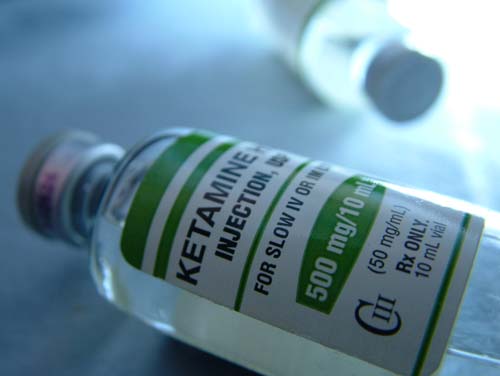In the first systematic review of the safety of ketamine treatments for depression, researchers report that dangerous side effects are not being adequately reported in the trials of the experimental drug. According to the authors, the long-term safety of ketamine use for depression remains unknown.
“Our findings suggest a selective reporting bias with a limited assessment of long-term use and safety and after repeated dosing, despite these being reported in other patient groups exposed to ketamine (eg, those with chronic pain) and in recreational users.”

That is, according to the study, researchers are generally careful to report safety and side effect data when ketamine is being examined for chronic pain or in studies of recreational use. However, when ketamine is studied for depression, researchers tend to ignore the safety and side effect concerns—often not bothering to report such issues at all.
However, the authors write that “Most people receiving ketamine had acute sideeffects.”
The study, published online ahead of print in Lancet Psychiatry, was led by Brooke Short at the New South Wales Institute of Psychiatry, Australia. The researchers conducted a systematic review of all the published trials of ketamine treatment for depression. Their goal was to assess the side effect profile and potential safety concerns of the experimental treatment, as reported in these trials.
Studies that did carefully report adverse events showed that “After acute dosing, psychiatric, psychotomimetic, cardiovascular, neurological, and other side-effects were more frequently reported after ketamine treatment than after placebo in patients with depression.”
Common side effects also resulted in a number of patients withdrawing from the study. Some of the many side effects that were reported included:
- Worsening mood
- Anxiety
- Emotional blunting
- Psychosis
- Thought disorders
- Dissociation
- Depersonalization
- Hallucinations
- Increased blood pressure
- Increased heart rate
- Decreased blood pressure
- Decreased heart rate
- Heart palpitations/arrhythmia
- Chest pain
- Headaches
- Dizziness
- Unsteadiness
- Confusion
- Memory loss
- Cognitive impairment
- Blurred vision
- Insomnia
- Nausea
- Fatigue
- Crying/tearfulness
Suicidal thoughts were also commonly reported side effects of ketamine use, and one suicide attempt was reported.
The authors report that the previously reported potential long-term harms of ketamine use include:
- Urinary tract problems
- Liver toxicity
- Ulcerative cystitis
- Neurocognitive deficits and memory problems
- Dependence and addiction
Short and her colleagues write that “Long-term side-effect risks or other potential side-effects, including cognition, urinary tract symptoms, or dependency risk, were rarely assessed or commented on in randomized control trials.”
In fact, very few of the studies systematically assessed for side effects—and those that did so may not have assessed for all potential forms of adverse events. Long-term harms were particularly absent from almost every study.
According to the researchers, only 20 randomized, controlled trials of ketamine for depression exist—and of these, most were “proof-of-concept” studies that used only a single dose and did not include follow-up. Altogether, these studies included 430 participants exposed to ketamine. Especially distributed across 20 studies, this number is considered very small when attempting to draw significant, generalizable conclusions about efficacy.
The authors write of the studies, “Very few examined the safety (or efficacy) of repeated treatments, relative to placebo or control treatment.” That is, it is still unknown whether repeated, long-term use of ketamine actually relieves depression—much less its long-term risk of harm.
Much of the supposed evidence for ketamine’s efficacy lies in open-label studies and case reports, which make up the bulk of the research so far. These types of studies are not methodologically rigorous and are prone to numerous forms of bias. For instance, open-label studies often do not include a control group. If they do, the researchers and participants generally know whether they are receiving the drug or placebo. These factors increase bias. Case reports are generally reports of the treatment of one or a handful of individuals, with no comparison group and no way to tell if it was the drug or other factors that resulted in improvement.
In summary, Short and her colleagues write:
“Data on the safety of this practice, including longterm outcomes, are essential before ketamine can be used for clinical treatment of depression.”
Because of the extensive list of potential adverse effects, and the unknown potential harms of long-term use, the researchers go on to recommend “large-scale clinical trials that include multiple doses of ketamine and long-term follow up to assess the safety of long-term regular use.” As it stands, the safety of ketamine treatment for depression is unknown—and that is largely due to inadequate and biased reporting of safety issues.
****
Short, B., Fong, J., Galvez, V., Shelker, W., & Loo, C. K. (2017). Side-effects associated with ketamine use in depression: A systematic review. Lancet Psychiatry. http://dx.doi.org/10.1016/ S2215-0366(17)30272-9 (Abstract)















Ketamine is an NMDA antagonist. Data suggest that antagonism of NMDA receptors on Fast spiking GABA interneurons is the basis for psychosis. In animals, ketamine will inhibit the NMDA receptors and also cause death of the fast spiking interneurons. Thus, ketamine trades depression for psychosis.
Report comment
Is glutamine in quantity an antidote for ketamine intoxication? I have anecdotal evidence (having used this technique on several cases of PCP-induced incoherence) that large quantities of glutamine counteract PCP intoxication, PCP having the same mechanism of action as ketamine. Doses of glutamine were 1g and up for PCP.
Report comment
Wow, what a surprise! Psychiatric researchers develop a new “wonder drug” but overstate its effectiveness and intentionally hide the large adverse effect profile. THAT’S never happened before…well, except for Benzedrine, Valium, Xanax, older antipsychotics, second generation antipsychotics, SSRIs…
— Steve
Report comment
No- they found an existing drug and tried to use it off-label. It was already around as an anesthetic, the way PCP was.
Report comment
OK, they used an existing drug “off label” and decided it was a wonder drug, and overstated its benefits and hid the adverse effects, etc…
Report comment
“According to the researchers, only 20 randomized, controlled trials of ketamine for depression exist—and of these, most were “proof-of-concept” studies that used only a single dose and did not include follow-up. Altogether, these studies included 430 participants exposed to ketamine. Especially distributed across 20 studies, this number is considered very small when attempting to draw significant, generalizable conclusions about efficacy.”
And one offs are considered science or worst yet, an experiment? And 1 suicide out of 430 participant with mostly one dose? My next question is how many doses did the participants have to take overall? Did anyone consider this a public safety risk? Dr Littrell brings up a fantastic point and the most anticipated side effect of this drug is psychosis. I would love to see the error band on that side effect, never mind what P comes out to or worst yet, what the confidence intervals are for psychosis.
I am really wondering what the Murphy Act has/has on this approval process. I know that a lot were concerned about the new FDA guidelines and public safety. Does anybody know what the new guidelines are?
Report comment